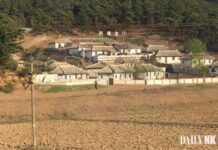[imText1]
A substantial proportion of the North Korean military are now malnourished, and in some areas have reached starvation point, according to a new interview with Ishimaru Jiro, the head of ASIAPRESS.
On Wednesday The Daily NK interviewed Ishimaru, who asserted based on information received from inside sources, “The majority of those people who are now suffering because of food shortages in North Korea are soldiers. In the case of the worst bases, more than half of the soldiers are malnourished.”
Ishimaru is among the best informed of all North Korea watchers, bringing with him an array of sources able to provide information on the recent food situation and market trends for both the military and public sphere.
According to Ishimaru, army rations are now so clearly inadequate that entering the military is now widely considered to be the best way to guarantee malnourishment. It is no surprise, then, that desertions and thefts of privately owned livestock are worsening.
– Soldiers going to sanatoriums in droves; desertions and thefts the norm
Ishimaru acknowledges that the food situation in the army was poor during the famine of the 1990s; however he says that the recent situation is worse.
Ishimaru cited the evidence of one ASIAPRESS journalist from North Pyongan Province, Kim Dong Cheol, who said, “The situation has become much worse this year. One officer from the Escort Command told me in January that his daily ration is just 300 grams of corn, which is not enough to avoid malnutrition. If it was that bad in January, it would have been worse during the usual farming hardship period.”
Choi Gyeong Ok, another correspondent from Yangkang Province described an even gloomier picture, telling Ishimaru, “Command HQ troops are getting 160 grams of corn every meal with a side-dish of ‘dried soy sauce’. They’re the well-cared for ones; 130 to 140 grams of corn and some salt water is all the average soldier is getting.”
“I met a young soldier in February who serves at Tongcheon in Gangwon Province, and he told me that he was recovering at home because of malnourishment,” Choi apparently added. “He said there were people starving within the army, and that as many as four soldiers would share a spoonful of salt as their side-dish.”
Ishimaru explained, “It is pretty common now for soldiers from every unit to sneak out after dark and steal livestock or other food from the public to try and deal with their hunger. Commanding officers give their troops some farm equipment, hoes and suchlike, telling them to come back with some vegetables or something for side-dishes, and so the soldiers go around to every house nearby and beg.”
Ishimaru obtained a video earlier this year which seems to corroborate the story; in it, a dozen scrawny-looking soldiers are apparently being conveyed to an unknown location. In one part of the video the young men are seen taking a break; unusually short and betraying obvious signs of hunger, they depict the seriousness of the situation.
“Our inside reporter questioned a few of them, but they did not answer,” Ishimaru said, commenting on the scene. “It looks like they’ve been ordered by their superiors to keep quiet about the malnourishment within the army.”
With the food situation in the army among the worst it has ever been, authorities are now taking rice and other food supplies by force in an effort to improve military supplies, Ishimaru also confirmed.
Inside journalist Kim Dong Cheol has confirmed something The Daily NK also reported earlier this year; that local People’s Units conveyed official government orders in January and February demanding food to support the army. Average households were told to contribute 1kg of rice, while Party or enterprise cadres were asked for 500kg. In particular, traders were given no choice but to supply this so-called ‘Patriot’s Rice’.
“The Kim Jong Il regime has its military-first policy, but the reality is that even the military is not being fed properly,” Ishimaru noted. “The government is weak and has no money, and therefore is unable to provide food. As a result, what they’ve done to try and procure food provisions from the start of this year is to demand support from external sources.”
– Workers in the military-industrial sector also falling into the vulnerable class
It is also known that workers in industries related to the military, who used to receive rations as a matter of priority, are also now no longer receiving them properly. Even rations for enterprises producing goods for export to bring in vital hard currency are not getting what they need.
For example, Kim Deong Cheol says that 80% of rations were still reaching workers in a coal mine near Suncheon in South Pyongan Province as recently as last year, although even then they did not receive any provisions for family, and in most cases wives were in some form of trade to make up the shortfall. However, since the start of this year rations have dropped much further, and in March and April the workers were only getting 10 to 15 days of rations a month.
“The average for the miners is one meal of corn rice, and the other two of noodles or porridge made from ground corn alone,” he explained. “The poor are getting by on two meals a day, and even that is just corn porridge.”
“We can say that people who are not involved in market trade, such as the military and those industries which support the military, now belong to the most vulnerable classes,” concluded Ishimaru, adding also that for civilians, “There is an abundance of rice in the market but people are going hungry because no one has any money to buy it.”
















